Film Name:掃毒2:天地對決 / The White Storm 2: Drug Lords
From 2013 to 2019, from director Rene Liu to Andrew Lau, from the “brotherly bond of three” to an amplified “duel of titans”… Aside from the ever-present lead actor Louis Koo, “The White Storm 2: Drug Lords” shares nothing with “The White Storm.” So watch this film without any preconceptions.
All signs point to “The White Storm 2” standing as a standout among current mainstream Hong Kong films…

Unfortunately, this film still fails to fully satisfy me. While it boasts several impressive strengths, it ultimately lacks the quality needed to elevate it from “decent” to “great.”
[Friendly reminder: Spoilers ahead.]
The phrase “all over the top, all sheer madness” aptly captures the essence of Hong Kong cinema. A defining characteristic of this style is its “speed,” though sometimes ‘speed’ also translates to “roughness.” In an era where Hong Kong films are increasingly fading from prominence, it’s hard to say whether we should rejoice or lament that “The White Storm 2” still embodies this very spirit.
Take the anti-drug theme, for instance. The film earnestly dedicates significant screen time to depicting the harsh reality that “one person’s drug use can shatter families, leaving survivors worse off than death”—a thoughtful and meaningful addition that elevates the narrative (rather than merely using an anti-drug backdrop as a plot device).

Yu Shuntian’s grandfather smoked opium, his father dealt heroin, and ultimately his son died from drug addiction—forcing him to treat “drug eradication” as a personal vendetta… This premise holds immense potential for compelling storytelling, yet the film’s portrayal of drug users’ “miserable state” mirrors real-life negative examples without significant deviation. Clearly, it makes no attempt to refine the “dramatic” aspects (including the case of classmate Xiao Lin who fell to his death after overdosing).
This results in the film’s portrayal of “the evil of drugs” and “the motivation for drug eradication” feeling somewhat superficial, costing it a perfect 10 in bonus points and leaving it with only 5 or 6.
A similar issue arises in the depiction of the drug dealers.

Given their limited screen time, it’s understandable that the drug dealers’ ruthlessness and hedonistic excess are glossed over. Yet, something memorable should remain for the audience—the two scenes where Di Zang enforces family justice in a frozen pork warehouse, and the hotpot scene, are perhaps the only extended character moments… Unfortunately, within this film’s context, their impact feels distinctly underwhelming.
These details may not determine the film’s success or failure, but they subtly shape its overall quality.
The true draw of “The White Storm 2” (or its primary marketing hook) lies in the “heaven-and-earth showdown” between Yu Shuntian and Di Zang.
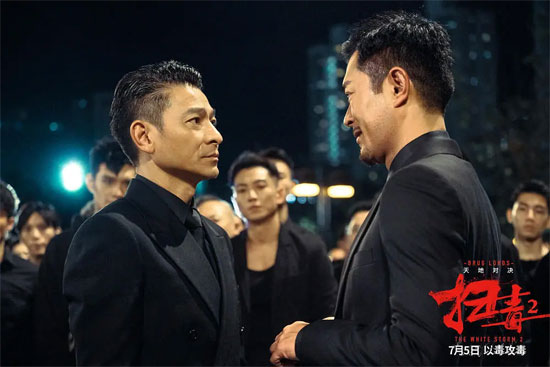
Hong Kong cinema has long cherished “twin heroes” narratives. Whether pitting good against evil, portraying love-hate relationships, or blurring moral lines, these duos invariably spark compelling tension.
In this regard, the setup of the two protagonists’ rivalry in “The White Storm 2” is quite compelling: one, having learned his lesson the hard way, voluntarily leaves the gang, successfully goes straight, and becomes a financial tycoon with a beautiful wife by his side—a true winner in life. The other, wrongfully punished and expelled from the family after being subjected to gang justice, cannot accept his fate and turns to drug trafficking, eventually becoming a notorious drug lord terrorizing the region.
Yet the film avoids the standard “twin heroes” dynamic, unfolding more as a three-way power struggle. It’s clear to any discerning viewer that Lam Ching-fung’s character, Lam Ching-fung, carries nearly as much weight as Yu Shun-tian and Di Zang in terms of screen presence.
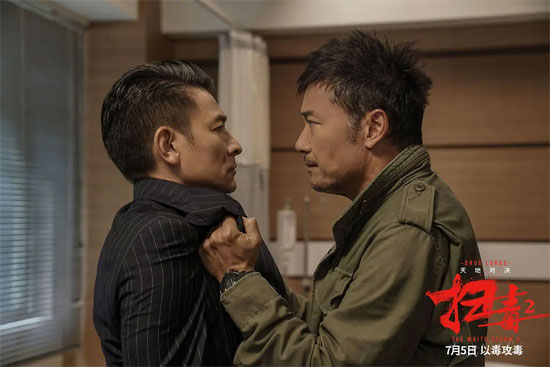
Di Zang, Lin Zhengfeng, and Yu Shuntian—one clad entirely in black, one entirely in white, and one white tinged with black—share similarities yet harbor more hostility toward each other… Had this “triangular drama” been fully realized, it would have surpassed the “dual hero narrative” in every way: depth, drama, and sheer excitement would have reached a whole new level.
Yet this is precisely the film’s greatest regret—it falls just short of achieving that final breath:
The film fails to strike the right balance. Its overall narrative still leans heavily toward Yu Shuntian and Di Zang’s “dual hero” dynamic, yet it hesitates to fully leverage the benefits of adding Lin Zhengfeng’s character. The result feels like an awkward “2.5-hero” version—not quite a dual-lead story with enough weight, yet severely imbalanced as a three-way drama, it feels unbalanced and underdeveloped, leaving some viewers unsure where to invest their emotional attachment.
Perhaps because the core of “The White Storm 2” feels underdeveloped, I actually found myself more drawn to some of the film’s side elements.
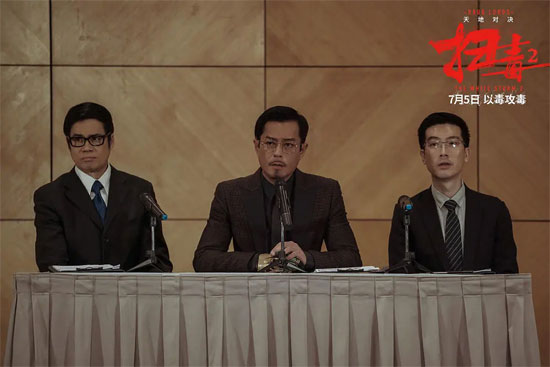
For instance, the media’s pursuit of celebrity scandals, the public’s adoration of “vigilante heroism,” and so on. My favorite part is when Di Zang uses “the rules” to get police protection from Yu Shuntian’s assassination attempt.
Police must have concrete evidence to arrest or investigate; otherwise, even if they know you’re a drug dealer, you’re only classified as a suspect. Yet vigilantes seeking revenge in the name of justice face no such constraints—they can decide whether their target is a drug dealer, whether they deserve to die, and carry out their own judgments and executions… Ultimately, Lin Zhengfeng ends up protecting Di Zang, the “legitimate businessman,” while holding his nose.
This effectively takes another swipe at Hong Kong’s Anglo-American legal system, still in use today. While such plot devices were commonplace in older Hong Kong films, few executed them with the depth achieved in The White Storm 2.
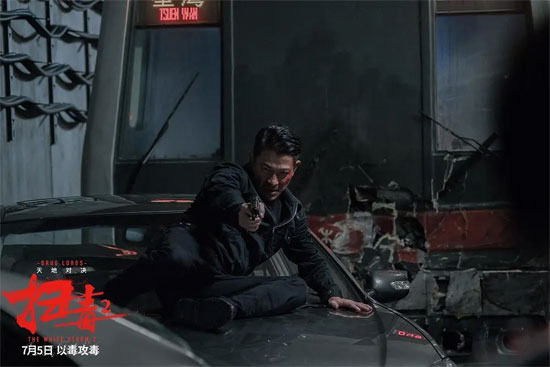
The irrationally driven Yu Shuntian resolves to destroy Di Zang’s body in Hong Kong, setting fire to everything—even the police—in a move that fully exposes his “unrighteous” nature.
On a minor gripe: the action sequences (gunfights) in The White Storm 2 are frankly underwhelming. Only the climactic chase—where two cars plunge into the subway station, culminating in a shootout and mutual destruction—offers any real excitement (and even that’s about it). Otherwise, there’s little else to commend in this regard.
Finally, I must once again commend the dedication of the two “model workers,” Andy Lau and Louis Koo. While they haven’t had many standout films in recent years, their professional attitude remains highly commendable.
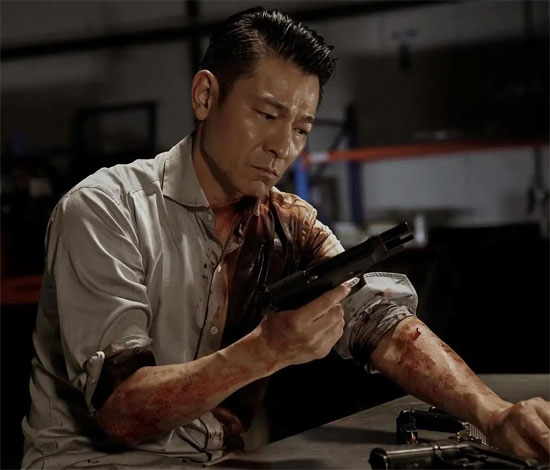
In “The White Storm 2,” I personally preferred Mr. Lau’s performance more, especially the scene where he silently loaded bullets alone after his wife, Zou Wen Feng, died—a moment filled with sorrow and rage that truly embodied the aura of a superstar.
Another collaboration between Boss Lau and Aaron Kwok that left a deeper impression on me was 2007’s “Protégé.” Coincidentally, that film also dealt with drugs, and both actors were nominated for Best Supporting Actor at the Hong Kong Film Awards for their performances in “Protégé”…
After the less-than-stellar “The White Storm 2: Drug Lords,” what kind of success can they achieve next? As this core group gradually steps back from the film industry, what lies ahead for Hong Kong cinema? This question feels both distant and right around the corner.
Please specify:Anime Phone Cases » The White Storm 2: Drug Lords 掃毒2:天地對決 2019 Film Review: It’s always just a breath away from being a great film.